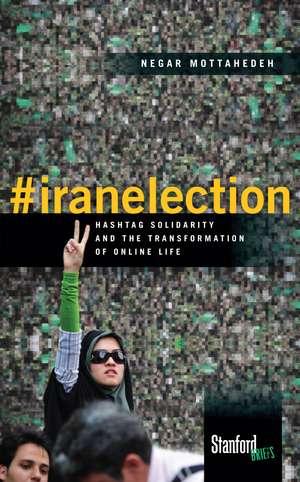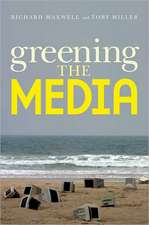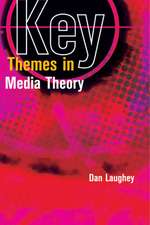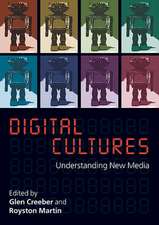#iranelection: Hashtag Solidarity and the Transformation of Online Life
Autor Negar Mottahedehen Limba Engleză Paperback – 14 iul 2015
The protests following Iran's fraudulent 2009 Presidential election took the world by storm. As the Green Revolution gained protestors in the Iranian streets, #iranelection became the first long-trending international hashtag. Texts, images, videos, audio recordings, and links connected protestors on the ground and netizens online, all simultaneously transmitting and living a shared international experience.
#iranelection follows the protest movement, on the ground and online, to investigate how emerging social media platforms developed international solidarity. The 2009 protests in Iran were the first revolts to be catapulted onto the global stage by social media, just as the 1979 Iranian Revolution was agitated by cassette tapes. And as the world turned to social media platforms to understand the events on the ground, social media platforms also adapted and developed to accommodate this global activism. Provocative and eye-opening, #iranelection reveals the new online ecology of social protest and offers a prehistory, of sorts, of the uses of hashtags and trending topics, selfies and avatar activism, and citizen journalism and YouTube mashups.
#iranelection follows the protest movement, on the ground and online, to investigate how emerging social media platforms developed international solidarity. The 2009 protests in Iran were the first revolts to be catapulted onto the global stage by social media, just as the 1979 Iranian Revolution was agitated by cassette tapes. And as the world turned to social media platforms to understand the events on the ground, social media platforms also adapted and developed to accommodate this global activism. Provocative and eye-opening, #iranelection reveals the new online ecology of social protest and offers a prehistory, of sorts, of the uses of hashtags and trending topics, selfies and avatar activism, and citizen journalism and YouTube mashups.
Preț: 111.63 lei
Nou
Puncte Express: 167
Preț estimativ în valută:
21.36€ • 22.17$ • 17.86£
21.36€ • 22.17$ • 17.86£
Carte tipărită la comandă
Livrare economică 15-29 martie
Preluare comenzi: 021 569.72.76
Specificații
ISBN-13: 9780804795876
ISBN-10: 0804795878
Pagini: 152
Dimensiuni: 127 x 203 x 13 mm
Greutate: 0.32 kg
Editura: Stanford University Press
Colecția Stanford Briefs
ISBN-10: 0804795878
Pagini: 152
Dimensiuni: 127 x 203 x 13 mm
Greutate: 0.32 kg
Editura: Stanford University Press
Colecția Stanford Briefs
Recenzii
"In a highly original book, Negar Mottahedeh offers a fresh perspective on the role of social media in the 2009 protest movement in Iran. Moving beyond clichéd analysis, Mottahedeh offers a nuanced mapping of the ways social media was integrated into the lived experiences of Iranian political life. In tracing the organic development of the Green Movement, the book provides glimpses into the ways Iran's history continues to color political memory and animate social movements."—Shiva Balaghi, Brown University
"Elegant, passionate, and deeply committed, #iranelection brings a much-needed historical perspective and non-Western viewpoint to the vexed question of the interactions of social media and social change. If you care about the history of the present, you need to read this book."—Nicholas Mirzoeff, New York University
"Negar Mattahedeh's #iranelection offers a gripping chronicle of human solidarity in the age of social media. Analyzing Iran's 'green wave' in 2009 as at once an online and on-the-ground event, she connects it with earlier media revolutions, from Algeria's radio-fuelled revolution against French colonial rule to the cassettes and phone calls of the 1979 Iranian revolution. In Mottahedeh's inspiring account, the people pick up where the state and official media institutions fail." —Jonathan Sterne, author of MP3: The Meaning of a Format
Notă biografică
Negar Mottahedeh is Associate Professor in Literature and Women's Studies at Duke University. She is the author of Displaced Allegories: Post-Revolutionary Iranian Cinema (2008) and Representing the Unpresentable: Historical Images of National Reform from the Qajars to the Islamic Republic of Iran (2007).
Descriere
#iranelection considers the role of social media in the 2009 post-election crisis in Iran and, in turn, the effect of the Iranian protests on the development and adoption of various social media platforms like Twitter, Facebook, and YouTube.












